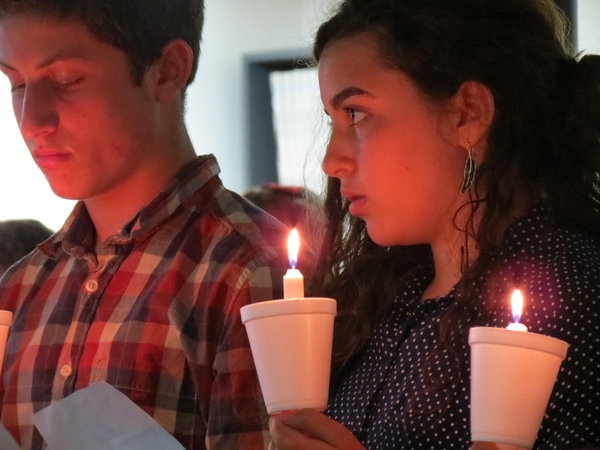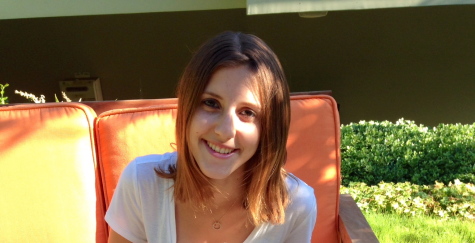On Yom Hashoah, a survivor who spoke for many others

MEMORIAL: Freshmen Nathan Benyowitz and Tania Bohbot read names of child victims at ceremony in Beit Midrash.
June 3, 2014
Fifty-five freshman students glided into the Beit Midrash holding lit candles as administrators, teachers and students gathered for an hour April 27 to commemorate the six million Jews who died during the Holocaust and hear the story of a survivor’s experience.
The crowd remained silent and sullen during the Choirhawks’ emotional performance of Pentatonix’s “Run To You,” and while five freshmen slowly read off the names of 55 of the countless children who died in the Holocaust. Then six yahrzeit candles were lit, one for each million souls lost.
The silence continued when Mr. Herman Fishman, grandfather of freshman Yaakov Sobel and a survivor of Auschwitz, began to speak.
Sitting in a large chair at the front of the room, Mr. Fishman described his life before the war, during and after the Holocaust. His story, he said, was like many, many others.
“My most vivid memory was being separated from my mother and sister,” said Mr. Fishman, who is 84. “They asked me how old I was and sent me in one line while my mother and sister went in the opposite direction.”
A Jewish man who helped him off the train had told him to say he was 16, so he did, even though he was only 14. This saved his life, he said, because males 16 and up were allowed to live. His mother and sister were gassed soon after. Mr. Fishman described his family’s Orthodox and secluded lifestyle in the countryside of Hungary, where they didn’t believe stories that drifted in about what was happening in the camps.
But he later learned for himself just how true it was. He also described how, at Auschwitz, he got a second chance at the “selection line” one day. Going before the German officer, he was selected for the group heading for the gas chambers. Realizing this, he ran to the edge of the camp, then ran back and joined the line again. The second time, he was selected for the group that lived.
Eventually Mr. Fishman landed in New York, where he eventually removed the numbered tattoo from his arms – not wanting to have to wear long sleeves to cover it all the time, he said, or to be an object of pity by those who saw it. He later moved to Los Angeles because his wife insisted, “the houses are all a different color.”
Meanwhile, he said, he had lost his faith in God.
“Or at least in the idea of a good God,” he said, “because a good God wouldn’t let this happen.”
As he told his story, his daughter Julie – Yaakov’s mother — was sitting among the students smiling. The students around her appeared captivated by Mr. Fishman’s story; people were attentive during his narrative and asked questions afterwards.
Mr. Fishman repeated numerous times that today’s students should keep the memory of the Holocaust alive. Students found his message convincing, and said they related to Mr. Fishman personally as well.
“I particularly appreciated how genuine he was,” said freshman Maayan Waldman. “Even though he was addressing a Modern Orthodox school, he still admitted that he lost faith after the Holocaust.”
The Choirhawks’ rendition of “Run To You” was accompanied by a video of Holocaust pictures compiled by sophomore Gabe Silverstein. The previous night, the group had performed the same song at Beth Jacob’s Holocaust event with a slide show by choir director Mrs. Keene.
The ceremony ended with an unvoiced nod of appreciation towards Mr. Fishman and an entire room full of people who had been admonished to remember and never forget. The Yahrzeit candles were still burning in the Bet Midrash on Wednesday.













